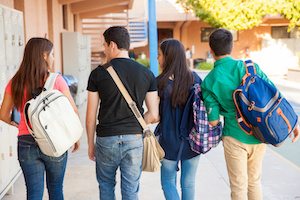Tag: back to school
A Teacher’s Tip for Back to School: Start Reading!

(A teacher’s perspective and another favorite of ours!)
Sleep in. Stay up late. Play video games…all day.
According to my high school students, they’d like to spend their summer vacation. Now, the reality may be different (parents?), but the freedom and possibility that summer represents to children – to all of us – is very real. Another very real thing: back to school has kicked off around the country.
But luckily, the freedom and possibility that make us love summer can also help your child successfully transition back to school, reading, perhaps even with a greater appreciation for it.
Why Read
If you found your way to this blog, fantastic! You are probably already convinced of the importance of reading for academic success. And mountains of research back you up. A Department of Education study assures us that families play a big role because the amount of reading done outside of school can greatly impact a student’s success in school.
Unfortunately, academic skills often decline over the summer. If your child has read nothing but tweets and fortune cookies all summer (ok, it happens), they might have begun a trip down the summer slide. But don’t panic. You still have time to get them back on track.
How To Read
In short: build stamina. From my experience, the first couple of weeks of school doesn’t pass without at least a couple students reminding me that my 8:45 English class is happening at least a couple hours before they’re supposed to be awake. But teachers often expect kids to hit the ground running. So begin to help your child find a reading routine. The reading requirements that are awaiting them in English class, social studies, science, economics, etc. will be much easier if your child is already accustomed to reading daily.
Now, if your child hasn’t been reading consistently this summer, start small. Fifteen minutes is probably about right for a middle or early high school student. They can do it. They will build from here, to 20, 25 even 30 minutes. Wouldn’t it be wonderful if your child started this school year reading 30 minutes daily? This is probably one of the most important things that you, as a parent, can do to support your child’s success in school this year.
What To Read
As a teacher, I have asked a student what he or she like to read and been told, “I dunno” innumerable times. Ah, yes. Often, behind the sullen, frustrated or bored tone is a child who genuinely doesn’t know what he or she likes to read. Don’t give up if you get this response!
I’ve found great success asking students about their favorite TV shows or movies and tying them to genres and books. Fans of Walking Dead can Google “young adult (YA) zombie novels.” Is Gossip Girl their thing? Run a search: “books like gossip girl.” Jurassic World? Ender’s Game? Hey, these two were originally books, so that’s easy! (Also, your local librarians would love to help your child find a book. They live for these moments.)
Don’t be disappointed if your child isn’t interested in “important authors” like Shakespeare, Hawthorne or Melville. That’s what school is for. Generally, in class, your child will be reading more difficult texts that are not easy to relate to or understand. Independently, your child should be able to choose. Shakespeare’s great, but he’s not at the top of my personal summer reading list either.
Remember, it doesn’t matter if you want to read this book or not. It matters that they do.
Where To Find Resources
Time to tap the Internet. There are many great online resources that can help your child become a better reader (I could do a whole post on them) and here are some good ones to get started.
Check out YourNextRead.com which features long lists of “to read” books for many of my students who “don’t like to read.” GoodReads.com also has hundreds of lists of books for every taste.
Then there are the sites with high-quality content, especially non-fiction, aimed at middle and high schoolers, here are a few:TeenInk (written by teens), NY Times Learning Network, Smithsonian’s TweenTribune.
Final Tips
It’s a simple thing, but reading logs can be a great motivator. From reluctant readers to bookworms, reading logs satisfy. It’s just gratifying to see how much you’ve read. You can find printables online, or simply keep track of the basic info on a piece of notebook paper: book title, start/end pages, and amount of time read. Do what seems most motivating for your child.
Discuss the books with your child to help develop deeper understanding – ask about the main idea, the plot, the characters, what the author is trying to achieve etc. (Think your child may need help with reading or writing? Check out free reading and writing assessments on Meemli Academy or just contact Meemli.)
And my favorite: read with them. Can you find fifteen minutes to actually sit down and read too? The most successful reading program I’ve ever experienced was at a school that had daily reading time during which the teachers were also required to drop everything and read. No email, no grading, no lesson planning, just read for pleasure. It was transformative for everyone. You can be a role model and inspire your child to read by doing it yourself.
What are your tips to get your kids reading? We’d love to hear them!
30 Aug, 2019
Plan To Enjoy The New School Year

(We’re re-sharing another of our annual favorites – take charge of your new school year!)
Does it feel like summer’s gone, though the calendar doesn’t say so? Are you beginning to feel stressed? Could be because your summer break’s ending (104 days, calculated according to Phineas and Ferb). Good news – being back to school is not all bad! Understandably, starting a new school year and getting adjusted to a new schedule can make you tense, but with the right approach, the new school year can be more enjoyable than you expect.
Here are some simple tips that can make all the difference on how you feel about getting back to school and starting a new year/grade.

Check Your Attitude.
There are plenty of ways that you can mentally prepare for the upcoming year. Try to approach the year with a positive attitude – just think of all the fun experiences you’ll have along the way! For example:
- School’s the only time in your life you get to see so many of your friends every day.
- You can reconnect with your favorite teachers and maybe you’ll get some new ones.
- You get to do extracurriculars and school activities – with friends!
Depending on how you’ve spent your summer, going back to school might feel like a complete turnaround, so it’s worthwhile to set aside some time to refocus yourself. According to the American Psychological Association, mindfulness can be defined as “a moment-to-moment awareness of one’s experience without judgment.” Mindfulness techniques come with a whole host of proven psychological benefits, like stress relief, increased focus, and better memory. While it may not suit everyone, it might be worth a look and a discussion with your parents on whether you should try it!
Make A Plan.
A new year means a new schedule, and a new schedule always takes some getting used to. We know you’ll be busy between your school and your extracurricular activities, but the amount that you’ll enjoy the upcoming year depends on your ability to budget your time. Make a plan ahead of time to reduce your stress and help you feel on top of your school life, instead of being burdened by it.
Part of making a plan is taking into consideration what is hard for you and what is easier. Keep that in mind as you make choices, if writing reports takes more work, make a note to yourself to always get started earlier on your reports. If you tend to get tense about tests, cut yourself some slack and don’t schedule too much the evening before one. When you’re making a detailed schedule, which you should (and parents should help their younger children with this), use your planner to keep track of all your commitments, not just the ones for school.
Finally, make your plan bigger – think about what you want to get done at the end of the school year. If possible, mix in personal goals (want to try out a new sport) with academic ones (want to improve writing skills) and even social ones (make new friends) and think about how you can go about achieving them – you have the whole new year ahead of you to work on them!
Use Your Support Network.
Even if you’re mentally prepared for the new year and have everything planned out, you can be sure that things will come up unexpectedly. Maybe your teachers pile on some extra assignments all at once, or you miscalculated your time and your weekly schedule is all out of whack. And of course, there are all the social pressures that come with school that can sometimes feel overwhelming.
When things get tough, go to your support network. It can be a combination of friends, family, teachers, coaches, anyone you trust to have your back and give you the support you need and the advice you seek. Don’t be afraid to lean others from time to time, but be ready to repay the favor when someone needs to lean on you.
Keep in mind, if the pressure gets to be too much, don’t hesitate to see speak to trusted adults and request professional help. There is no shame in that (it happens to millions of people worldwide) and getting the right kind of support can help you feel a whole lot better.
These are just a few of the ways you can get ready to make the most out of the new school year. To kick it off, check out this song, a blast from the past you can listen to while you start planning your future. What are your favorite ways to get ready for school? Let us know in the comments below!
16 Aug, 2019
New School Year Challenges – How Can You Help?
The end of summer break is like a ‘reset’ button, immersing students in the ‘new’: new teachers, new classes, new locker combinations, new peers – and new school year challenges.
The challenges can seem daunting but a little awareness and prep can help your child zip past them and get on track for success. Here’s how.

The Structured Life.
No more “What shall we do today?”. The school year brings structure back, and it helps if you build routines to keep life running smoothly. By the time your kid is in middle/high school, you know the drill and are geared up to have The Plan up on the fridge (and on everyone’s online calendars!). But school demands, your child, and life, have changed in the past year, so here you go again.
Build a new routine for this year, paying attention for what’s needed now.
Make sure your child is the primary creator of the routine, not you as she has to own and follow it.
Leave enough time for sleep. Lack of sleep affects your child’s physical, emotional and brain health and, of course, performance in school (teachers can attest to that!).
Help your child block out time every day for some feel-good activity. Relaxing for little while shooting hoops with friends or watching a favorite dance show on TV helps keep stress levels down.
Don’t expect everything to work from Day 1! Both your child and you should prepare to roll with it and adjust as needed.
Expectations, with Due Dates Attached.
School also brings deadlines for book reports, weekly quizzes and voluminous homework. Switching from the easy, lazy days of summer vacation to the constant demands of school is difficult for most students, but these three simple coping techniques will help.
Schedule the Work
Three words: use a planner. Schools usually provide planners/agendas for all students, get one if your child’s school doesn’t. Generally, successful students keep track of deadlines. I have never had a student who was diligent about due dates fail my class.
Using a planner is a very useful life skill, but initially hard for most adolescents. Help your child in developmentally appropriate ways. For a middle schooler this might mean a daily check with the planner, while high schoolers may only need a weekly conversation or a monthly review to make sure academics and extra-curriculars are all balanced.
Teach your kids to pace out assignments. When I’ve done this with students, I can see the light bulb go on: “You mean, I have to read 10 pages every night to finish this 200 page book in three weeks?!” Exactly. But then they get it and feel more in control.
Ask the Teacher
Successful students do not hesitate to ask teachers questions. Most teachers love it as it signals to them that a student is interested in learning, but many students are diffident, especially with new teachers. Encourage your child to start with simple questions early in the year (“Ms. Jones, could you point me to room 112?”) so he’s comfortable asking for guidance whenever he needs it.
Provide Support
If your child is struggling with any part of the academics, it is best to address it as soon as possible. Maybe you and your child already know that she’s comfortable with science but struggles with writing. If so, acknowledge it early on, and offer to assist her. If you can’t do it yourself, get outside support. Your child will be much less stressed knowing that if needed, she can get guidance from teachers, peers, outside tutors or online resources.
The Social Jungle.
Adolescents are busy figuring out identity: Who am I? Who will I become? And there’s the desire to belong, to fit in, and the inevitable concerns about popularity. There is no way to “save” your child from these social pressures, no way to prevent them from having to make hard choices. But you can help them run the social gauntlets relatively unscathed.
Communicate
Teach your child to talk through issues, if not with you, with other trusted adults, older siblings, or the best friend now at another school. Your child should know that she’s not alone.
To keep your child communicating with you, stay involved and most importantly, tolerate minor changes. Chartreuse hair? Incomprehensible music? As a teacher, I’ve seen that when students feel accepted, they tend to behave more acceptably and push back when they feel judged. As a parent you should help reduce your child’s stress, not contribute unduly to it.
Maintain Perspective
Even if schools are doing more to help students adjust, transitioning back to school, especially a new one, can be overwhelming. Help your child understand (and you should too!) that this is normal. Reassure them that in a few weeks, the unfamiliar and uncomfortable may seem boringly routine. With a little nudging, they may remember times when they dug into their own resilience and survived and feel confident they can do so again. Fights with friends and “OMG! I’m so embarrassed!” moments do fade with time.
Get Help
Also, it helps to remember that every child is unique and what is easy for one may be anxiety-inducing for another. Be patient, but if you notice that you son or daughter is not doing better, don’t hesitate to speak to the counselor or seek professional help – it may not be possible for you or your child to resolve on your own.
Change creates challenges, but they don’t have to be crushing. And your child is learning a valuable life skill by dealing with them.
How do you and your child approach the new school year? Let us know!
21 Aug, 2018
What Should Be In My Backpack For School
It’s that time of year – summer is coming to an end, as is your summer break! You’d have received a list of “must-have” items from your school and started shopping for everything from textbooks to new pencils, but if you’re new to this, you’re probably wondering what else should be in your backpack for school.
The good news is that millions of students go through this every year and we can learn from them. Here’s our team’s simplified list of what to consider when readying your messenger bag or backpack for school.
 Keep your backpack light enough to to walk upright!
Keep your backpack light enough to to walk upright!
Let’s start with what will go into the “big pocket”.
Books
When packing books, remember to actively use your locker! Think about where your locker is located in relation to where your classes are for the day. If you can leave a few books in your locker, it will help lighten the weight of your bag. You can also store one or two books that you can read in your spare time, during study hall, lunch or at the end of the day.
Notebooks and Folders
How many notebooks do you need? You may need one per class. We also recommend putting loose sheets in folders so they don’t get crumpled. Again, you don’ t need to carry every notebook with you all day if you make use of your locker.</
Planner
Your school may be one that provides their students with a planner on the first day of school. If your school doesn’t, it is important that you get one to put in your backpack for school. A planner will help you keep track of your assignments, tasks and extracurricular activities. If you prefer a digital planner, here are some options!
Pencil Pouch
Pens, pencils, highlighters – have 2-3 of each in case you lose one or need to lend one to a friend. And it really makes sense to put them all in a pouch so you’re not digging around the bottom of your backpack when you’re in a rush to find one! By the way, schools may have sharpeners, but it is nice to have one handy just in case you’re working outside the classroom.
Laptop/Tablet
If you use your own computing device at school (not limited to what your school provides in the classroom), remember to bring a charger too. It is also best to put your laptop/tablet in a protective pouch or cover to keep it from getting scratched in your backpack.
Personal Items
Though much of your cosmetic, grooming or personal items may be left in your locker, you may want to have some of them handy in your backpack. Putting them in a pouch makes it easier to access them when you need to and keeps you from accidentally melting chapstick over your books! You may also want to include any critical medical items (e.g. your inhaler) here so you can get to them immediately if necessary.
Now let’s look at what you can put into the “small pocket”.
Flash Drive
These are super handy to save files or backup important work that you may take from home to school for example. They’re even useful to share extra large files with your friends, especially if you’re working on video projects together.
Calculator
If you need a scientific calculator, you can keep it in the small pocket if it is large enough to hold it.
Wallet
Don’t forget your wallet! Your debit/credit cards, cash and ID can be stored in the small pocket of your backpack or, you can carry your wallet in your pocket if you prefer.
Phone/Headphones
The small pocket is a good place to stash your phone and headphones, unless you’d rather have them in your pocket!
There are a lot of other items that you may need: gym shoes/clothes, water bottle, lunch (if you pack your own) etc. It may be better to pack your athletic items in a sports bag to leave in your locker and put your lunch in a separate pack/container to keep it from getting crushed and leave that in your locker too if you can.
Want more tips on what you need for your backpack for school? Check out these images for more ideas.
Have tips you’d like to share? Leave a reply!
15 Aug, 2017
New School Year Checklist for Parents

The start of a new school year is stressful for students of course, but the transition from summer relaxation to the packed schedule of school is tough on parents too. Whether your child is moving into middle or high school, or just going back to start a new grade, there are some essential steps you can take early on for smooth sailing the rest of the year.
1. Stock Up.
-
- Old school: Schools usually have their supply needs down to a science, but there are always those items that your child seems to run out of throughout the year. Save yourself time and expense by purchasing items in greater quantity now. We love this basic supplies list from Real Simple.
- New school: It is important to consider digital accessibility for school assignments be it laptop, desktop or tablet. If those items are shared between family members plan out access in advance to avoid conflicts later!
2. Build a Morning Routine.
-
-
- Plenty of Sleep! Making sure you get enough sleep (and your child does too) will pay enormous dividends in your ability to handle the hurried mornings and hectic days.
- Wake Up Time. Yes, your child is old enough to to be getting themselves out of bed on time. If you suspect the mornings may not run like clockwork just after summer vacation, consider adjusting your wakeup time to make sure you can help with unexpected snafus.
- Getting Ready. How can you make things as easy as possible for yourself during the daily prep-for-school process? Perhaps you do this by having lunch items prepped and ready in advance so they’re easy for you or your child to grab and pack. Review appropriate apparel choices that fit the school’s dress code with your child and either go through the closet in advance or create a system for checking in with each other.
- Take Care of Yourself. Whether it’s 10 minutes of guided meditation, or just a quiet cup of coffee before the alarms go off, putting moments in your morning to take care of your own needs are crucial to staying stress-free in the early days of the new school year.
-
3. Get it on the Calendar.
-
-
- Spread the Word! Get it on EVERYONE’s Calendar, not just yours. Make sure key dates are shared with your spouse, grandparents, childcare providers and anyone else who may be helping you with before and after school logistics.
- Put Your Dates on Your Child’s Calendar. Note your family’s business travel or special events on your child’s calendar to make sure they’re factored in when scheduling.
- Pay attention to the Extra-Curriculars. A new school year often means that your child may want to try a new activity, a new sport or join a new club. Be realistic about how much you and your child can handle and work with your child to select programs that work best for both of you.
-
4. Get to Know Your Child’s School
-
-
- Review the School’s Rules. Basic policies concerning dress code and cell phone use can vary widely from school to school. Read up on them to avoid any unpleasant surprises.
- Take a Tour. Understanding how the campus is laid out and how your child will travel throughout the school will make the transition seem less overwhelming.
- Review Your Child’s Subjects. Also understand the expectations of those courses. This can help you identify potential challenges in advance.
- Connect With Your Child’s Teachers. You don’t have to wait until you’re called in for a conference. Reach out to teachers at any point early in the year to learn more about the class itself or how your child is faring.
- Get to Know Other Parents. Parents of children the same age as yours are great for understanding shared experiences. Parents with children who have been in the school can help you understand how the school works from the parent perspective.
-
5. Offer Learning Support
-
-
- Check in Everyday. No matter what the quality of your school, check in with your child everyday and be prepared to help if needed.
- Offer Help Yourself. If you know when your child has quizzes or papers due, and you have the capacity for it, you can offer your assistance in preparing or reviewing.
- Line Up Resources. Acquaint yourself with the resources offered or recommended by the school or teachers for more structured help outside of the classroom. Also research online options, like Kahn Academy or Meemli to add to your list.
- Know How Your Child Learns. Discover how your child learns best, so you can select the option that will be the most useful for your child. Here’s a quiz that can help determine tween learning styles you can do on your own, and here’s one your teen or tween can do themselves.
-
We hope you find this list helpful in making the start of the new school year easier to manage. Let us know if you have other favorite tricks to breeze through back to school!





